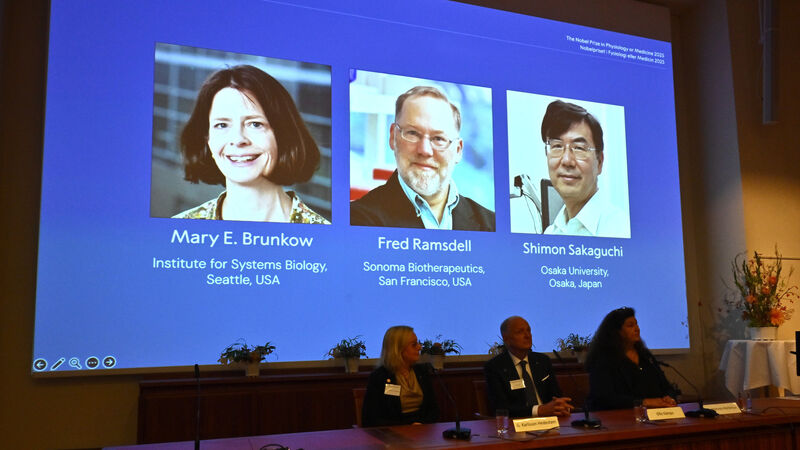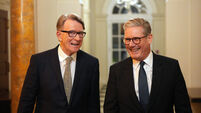Nobel Prize in Medicine honours work on peripheral immune tolerance

Mary E Brunkow, Fred Ramsdell and Shimon Sakaguchi have won the Nobel Prize in Medicine for their discoveries concerning peripheral immune tolerance.
Ms Brunkow, 64, is a senior programme manager at the Institute for Systems Biology in Seattle.
Mr Ramsdell, 64, is a scientific adviser for Sonoma Biotherapeutics in San Francisco.
Mary Brunkow, Fred Ramsdell and Shimon Sakaguchi have been awarded the 2025 Nobel Prize in Physiology or Medicine for their groundbreaking discoveries concerning peripheral immune tolerance that prevents the immune system from harming the body.
— The Nobel Prize (@NobelPrize) October 6, 2025
The Nobel Prize laureates… pic.twitter.com/h2yVHYSbxH
Mr Sakaguchi, 74, is a distinguished professor at the Immunology Frontier Research Centre at Osaka University in Japan.
The immune system has many overlapping systems to detect and fight bacteria, viruses and other bad actors.
Key immune warriors such as T cells get trained on how to spot bad actors.
If some instead go awry in a way that might trigger autoimmune diseases, they are supposed to be eliminated in the thymus – a process called central tolerance.
The Nobel winners unravelled an additional way the body keeps the system in check.
The Nobel Committee said it started with Mr Sakaguchi’s discovery in 1995 of a previously unknown T cell subtype now known as regulatory T cells or T-regs.
Learn more about the 2025 #NobelPrize in Physiology or Medicine
— The Nobel Prize (@NobelPrize) October 6, 2025
Press release: https://t.co/Ym5hOnKKQM
Popular information: https://t.co/PBLjVfddsi
Advanced information: https://t.co/G5hzQLEPqJ pic.twitter.com/8wDZruKTDW
Then in 2001, Ms Brunkow and Mr Ramsdell discovered a culprit mutation in a gene named Foxp3, a gene that also plays a role in a rare human autoimmune disease.
The Nobel Committee said that two years later, Mr Sakaguchi linked the discoveries to show that the Foxp3 gene controls the development of those T-regs – which in turn act as a security guard to find and curb other forms of T cells that overreact.
“Their discoveries have been decisive for our understanding of how the immune system functions and why we do not all develop serious autoimmune diseases,” said Olle Kampe, chairman of the Nobel Committee.
Thomas Perlmann, secretary-general of the Nobel Committee, said he was only able to reach Mr Sakaguchi by phone on Monday morning.
“I got hold of him at his lab and he sounded incredibly grateful, expressed that it was a fantastic honour. He was quite taken by the news,” Mr Perlmann said.
He added that he left voicemails for Ms Brunkow and Mr Ramsdell.
The award is the first of the 2025 Nobel Prize announcements and was announced by a panel at the Karolinska Institute in Stockholm.
Our immune system is an evolutionary masterpiece. Every day it protects us from the thousands of different viruses, bacteria and other microbes that attempt to invade our bodies. Without a functioning immune system, we would not survive.
— The Nobel Prize (@NobelPrize) October 6, 2025
One of the immune system’s marvels is its… pic.twitter.com/TzBWuIrTgn
Nobel announcements continue with the physics prize on Tuesday, chemistry on Wednesday and literature on Thursday.
The Nobel Peace Prize will be announced on Friday and the Nobel Memorial Prize in economics on October 13.
The award ceremony will be held on December 10, the anniversary of the death of Alfred Nobel, who founded the prizes.
Nobel was a wealthy Swedish industrialist and the inventor of dynamite.
He died in 1896.
The trio will share the prize money of 11 million Swedish kronor (£870,000).










